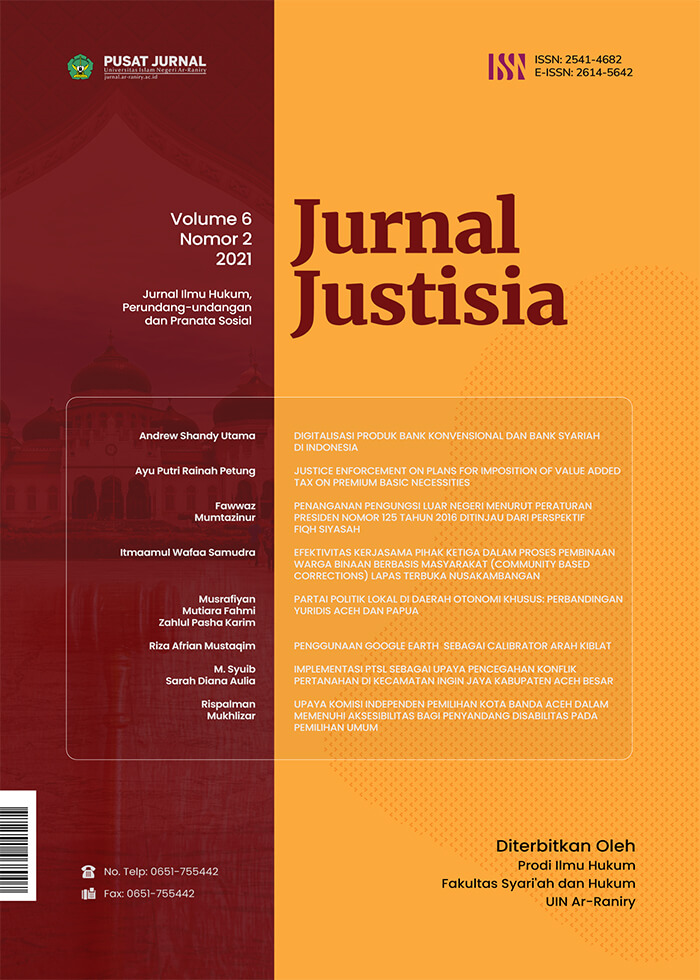Digitalisasi Produk Bank Konvensional Dan Bank Syariah Di Indonesia
DOI:
https://doi.org/10.22373/justisia.v6i2.11532Abstract
Technological developments make the world borderless. The development of information and communication technology has touched the banking sector. Based on the operational system, the types of banks can be divided into conventional banks and Islamic banks. This study aims to explain the digitalization of conventional bank products and Islamic banks in Indonesia. The method used in this research is normative legal research. The development of information and communication technology has touched the banking sector. As one of the efforts to increase bank capability, more optimal utilization of information technology development is a prerequisite in supporting bank service innovation. Therefore, digital banking is a very potential business opportunity and an inevitable necessity in the banking sector in the digital era. In addition to increasing the efficiency of bank operational activities, digital banking can improve the service quality of conventional banks and Islamic banks to customers in transactions. The Financial Services Authority of the Republic of Indonesia then issued Financial Services Authority Regulation Number 12/POJK.03/2018 concerning the Implementation of Digital Banking Services by Commercial Banks. There are forms of e-Banking services that can be used at conventional banks and Islamic banks, namely ATM (Automated Teller Machine), EDC (Electronic Data Capture), internet banking, SMS banking, mobile banking, e-Commerce, phone banking, and video.
References
Abdul Ghofur Anshori. Perbankan Syariah di Indonesia. Yogyakarta: Gadjah Mada University Press, 2009
Andrew Shandy Utama. “Independensi Pengawasan terhadap Bank Badan Usaha Milik Negara (BUMN) dalam Sistem Hukum Nasional di Indonesia”. Jurnal Soumatera Law Review, Volume 1, Nomor 1, 2018
Andrew Shandy Utama. “History and Development of Islamic Banking Regulations in the National Legal System of Indonesia”. Jurnal Al-‘Adalah, Volume 15, Nomor 1, 2018
Andrew Shandy Utama. “Sejarah dan Perkembangan Regulasi Mengenai Perbankan Syariah dalam Sistem Hukum Nasional di Indonesia”. Jurnal Wawasan Yuridika, Volume 2, Nomor 2, 2018
Andrew Shandy Utama. “Perkembangan Perbankan Syariah di Indonesia”. UNES Law Review, Volume 2, Issue 3, 2020
Andrew Shandy Utama, Rizana, dan Ade Pratiwi Susanty dalam buku Transformasi Digital dari Berbagai Aspek. Transformasi Hukum pada Digital Banking. Solok: Insan Cendekia Mandiri, 2021
Andrew Shandy Utama dan Sandra Dewi dalam buku Edupreneurship. Bank Syariah dan Halal Entrepreneurship di Indonesia. Solok: Insan Cendekia Mandiri, 2021
Arifin Djakasaputra, Oscarius Yudhi Ari Wijaya, Andrew Shandy Utama, Corry Yohana, Buyung Romadhoni, dan Mochammad Fahlevi. “Empirical Study of Indonesian SMEs Sales Performance in Digital Era; The Role of Quality Service and Digital Marketing”. International Journal of Data and Network Science, Volume 5, Nomor 3, 2021
Djoni S. Gazali dan Rachmadi Usman. Hukum Perbankan. Jakarta: Sinar Grafika, 2012
Hasnati, Sandra Dewi, dan Andrew Shandy Utama. “Perbandingan Prinsip Good Corporate Governance pada Bank Konvensional dan Bank Syariah dalam Sistem Hukum di Indonesia”. Jurnal Mizan, Volume 3, Nomor 2, 2019
Kasmir. Dasar-dasar Perbankan. Jakarta: Rajawali Pers, 2012
Muhamad Djumhana. Hukum Perbankan di Indonesia. Bandung: Citra Aditya Bakti, 2003
Rachmadi Usman. Aspek-aspek Hukum Perbankan di Indonesia. Jakarta: Gramedia Pustaka Utama, 2001
Selamet Ratijo. “Perlindungan Hukum bagi Nasabah Bank Pengguna Mobile Banking terhadap Kejatahan ITE”. Jurnal Fatwa Hukum, Volume 1, Nomor 1, 2018
Veithzal Rivai dan Arviyan Arifin. Islamic Banking. Jakarta: Bumi Aksara, 2010
Downloads
Published
Issue
Section
License
The Authors submitting a manuscript do so on the understanding that if accepted for publication, copyright of the article shall be assigned to Jurnal Justisia : Jurnal Ilmu Hukum, Perundang-undangan dan Pranata Sosial, Ar-Raniry State Islamic University, Indonesia as the publisher of the journal.
Jurnal Justisia : Jurnal Ilmu Hukum, Perundang-undangan dan Pranata Sosial right of first publication with the work simultaneously licensed under Creative Commons Attribution-ShareAlike 4.0 International License (CC BY-SA 4.0) that allows others to share (copy and redistribute the material in any medium or format) and adapt (remix, transform, and build upon the material) the work for any purpose, even commercially with an acknowledgment of the work's authorship and initial publication in Jurnal Justisia : Jurnal Ilmu Hukum, Perundang-undangan dan Pranata Sosial. Authors are able to enter into separate, additional contractual arrangements for the non-exclusive distribution of the journal's published version of the work (e.g., post it to an institutional repository or publish it in a book), with an acknowledgment of its initial publication in Jurnal Justisia : Jurnal Ilmu Hukum, Perundang-undangan dan Pranata Sosial. Authors are permitted and encouraged to post their work online (e.g., in institutional repositories or on their website) prior to and during the submission process, as it can lead to productive exchanges, as well as earlier and greater citation of published work (See The Effect of Open Access).

